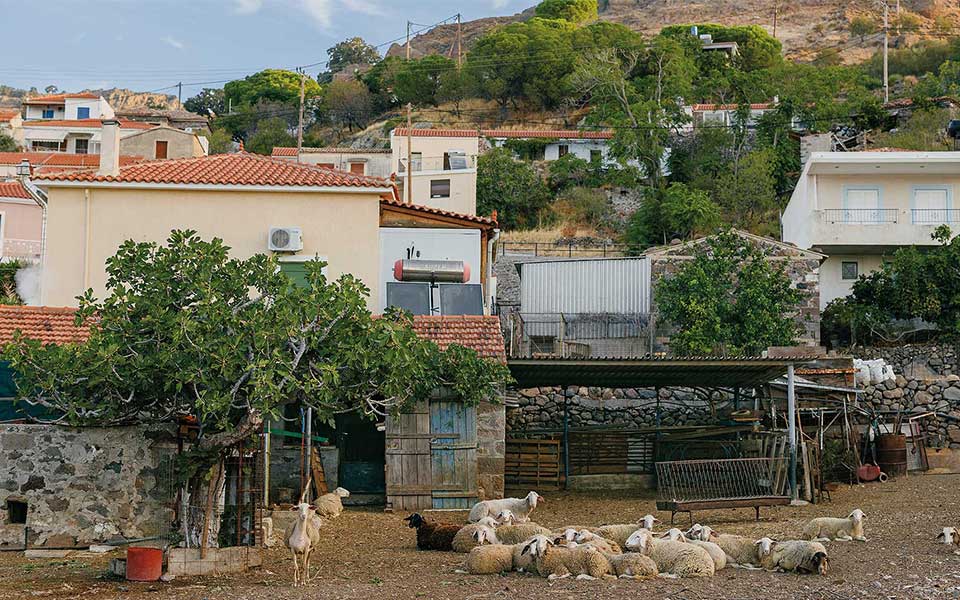Lesvos produces so much olive oil that it was traditionally used not only for cooking but also for food preservation. The most well-known example is the local ladotyri (olive oil cheese), a type of sheep’s milk cheese known as kefalaki, which was traditionally stored in olive oil-filled jars to mature and preserve.
By the time it was finally taken out to pair with ouzo, it had developed a spicy flavor that was accentuated by the qualities of fine olive oil. This practice faded over time as, on the one hand, olive oil became more expensive, and, on the other, it became clear that, with increased production and widespread distribution of the cheese in less-than-ideal conditions, the olive oil became rancid, giving the cheese an unpleasant taste.
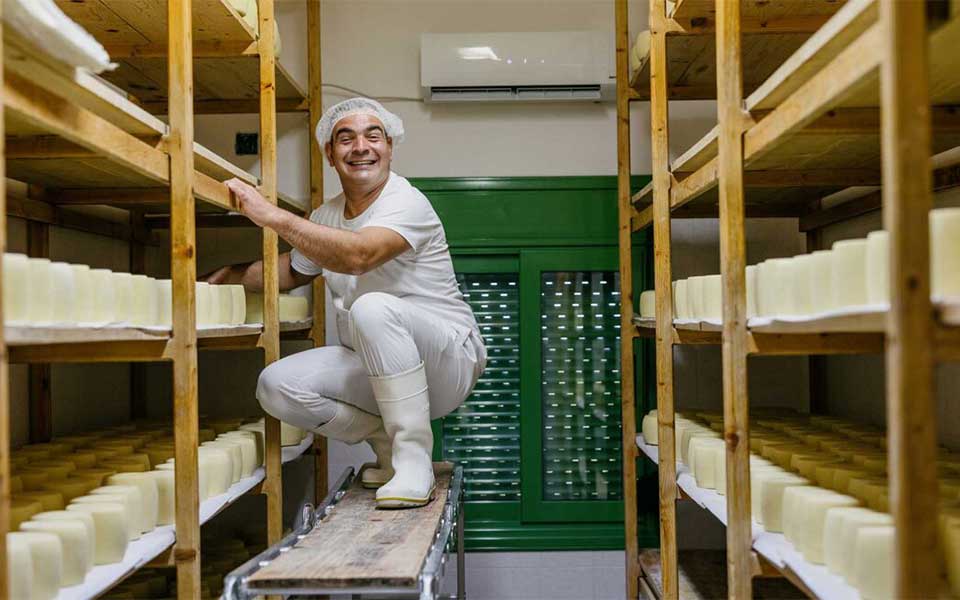
© Angelos Giotopoulos
“Last year’s ladotyri,” as the locals call it, meaning cheese that has been aged in oil for a year, is a rare delicacy that is now only made at home. Some professional cheesemakers coat the kefalakia with olive oil during the aging process, others package them in a small amount of oil and seal them in a vacuum, while most sell them without oil, as the legislation governing PDO Mytilene oil cheese does not require the cheese to be aged in oil.
The cheese produced by Giorgos Vasilas in his vertical cheese-making unit in Mesotopo, one of the island’s traditional cheese-making areas, immediately stood out among the ten outstanding ladotyri cheeses that the Gastronomos team sampled.
“One kilogram of ladotyri cheese requires 7 liters of sheep’s milk,” explains Giorgos Vasilas. The whole sheep’s milk they use comes from animals on his father’s farm. The 2,000 Lesvos sheep, one of the country’s most important breeds, graze over a large area in their model unit and roam the surrounding areas, including Hrouso, Podaras, and the semi-mountainous region of Mesotopos They feed on green grass from Lesvos’ grasslands and good animal feed, such as clover and mixed grains, to produce higher-quality milk in larger quantities. Birth planning and alternate milking ensure fresh milk throughout the year, delivered hot and steamy from father to son on the same day, straight from the milking parlor.
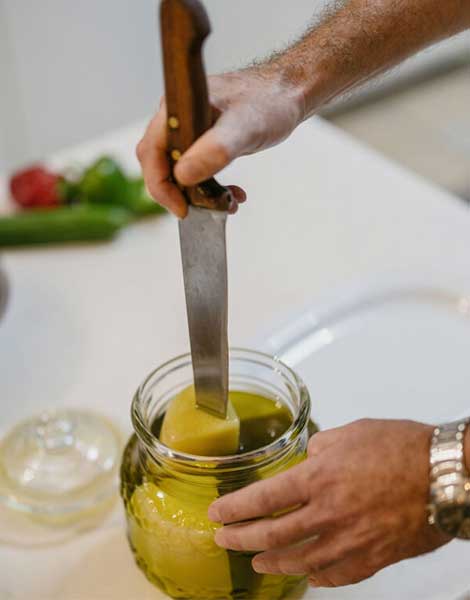
© Angelos Giotopoulos
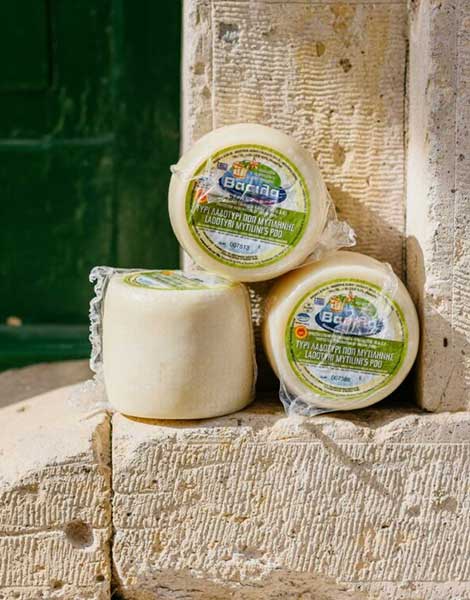
© Angelos Giotopoulos
The well-appointed dairy began operations in 2007 with modern equipment but a limited daily production capacity. With careful planning and dedication, they can produce sufficient quantities of delicious cheeses with distinctive flavors. Giorgos is a fourth-generation farmer and cheesemaker who graduated from the Dairy School of Ioannina. He works with a small team that includes his mother Christina, his food technologist wife Maria Konstantidelli, and two assistants.
Like all ladotyri cheeses, theirs is made using the traditional kefalotyri cheese technique, which has been used by the Vasilas family for years. They shape the cheese into small wheels weighing 1 kg, an old practice from when it was preserved in oil and had to fit into jars. According to the modern cheesemaking process, ladotyri cheese is matured in special chambers for 15 days after being placed in a strong brine. It is then refrigerated for at least three months to “become tame,” as Giorgos says, before being packaged and sold.
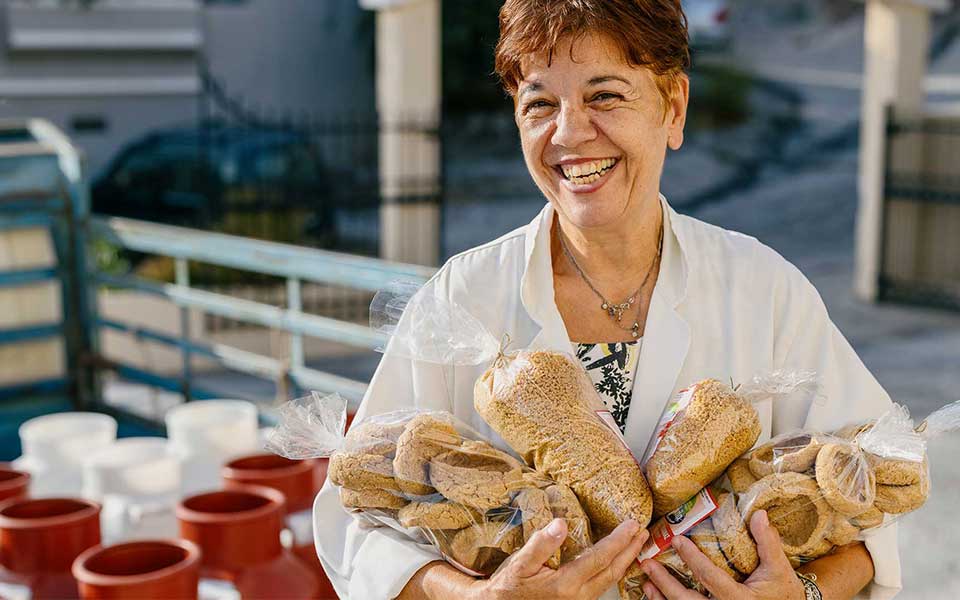
© Angelos Giotopoulos
The Vasilas family’s ladotyri cheese has a dense milky flavor that’s buttery, completex, slightly spicy, and aromatic. “People who want old-style ladotyri cheese make it themselves at home. They store the wheels they get from us in containers of olive oil for 3 to 6 months in a cool place to prevent the oil from turning rancid. We do the same at home to serve when we have guests. Not everyone likes ladotyri cheese, because it can become sharp and very spicy,” Giorgos explains.
They also make smooth-tasting feta, which also ranked “best in class” in the Gastronomos magazine blind tasting, a delicious graviera cheese, soft anthotyro cheese, an amazingly full-flavored dry myzithra cheese, traditional cream top sheep yogurt, trahana, and incredible sour milk and ground wheat hahles (traditional Lesvos pasta). The hahles (tarhanas molded into small fist-sized portions) are made by the neighborhood women, together with Giorgos’s mother and mother-in-law, using a painstaking traditional process. Hahles make a great snack when stuffed with feta and baked in the fireplace, or a hearty meal when broken up and cooked in soup. The ladotyri cheese is their everyday cheese, always on the table; they always serve it with ouzo and enjoy it either raw, left out of the refrigerator to sweat, or cooked in a small frying pan to release its pungent smell.
Vasilas diary won First Prize at the 16th Gastronomos Quality Awards, organized by Gastronomos, Greece’s leading food magazine and held in December of 2023.
This article was previously published in Greek at gastronomos.gr.

